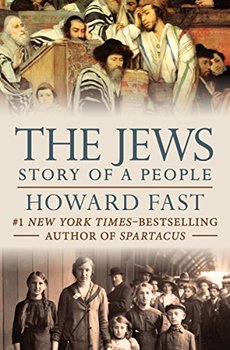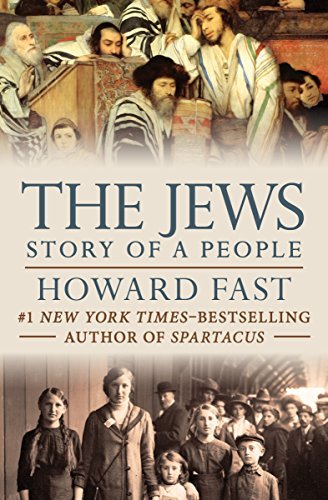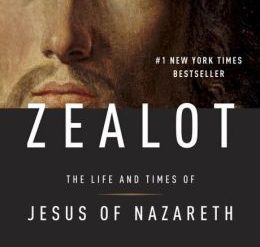
If you’ve been taught that God handed down the Ten Commandments to Moses on Mt. Sinai, and that the Jewish people ever afterward worshiped a single almighty god, you owe it to yourself to read Howard Fast’s extraordinary book, The Jews. As Fast reveals in this eminently readable and endlessly fascinating story, neither of those myths is true—but the true stories are even richer and more compelling. In just four hundred pages, one of the most prolific authors of the twentieth century manages to upend many of the prevailing beliefs about the history of the Jewish people. This is Jewish history full of surprises.
A spirited Jewish history full of surprises
Fast’s tale of the Jewish people in prehistoric times is fascinating. His account of the Beni-Yisrael (the Children of Israel, the Bedouin people of Abraham, Isaac, and Jacob) casts light on the Biblical account, fleshing it out in some ways, contradicting it in others. In fact, for hundreds of years, the Beni-Yisrael and the Jews Moses led from Egypt about 3,250 years ago were essentially separate peoples linked only by the fraying threads of history and language.
The Jews: Story of a People by Howard Fast (1968) 424 pages ★★★★★
As Fast writes, “the Bible is the history of Moses and the God Yahweh from the point of view of the single powerful tribe that gained ascendancy over the rest of the Beni-Yisrael, the Tribe of Judah, the Yehudim, the Jews.” In fact, “the northern tribes feared and hated the Jews, whom they looked upon as barbarians. On the other hand, the Jews, fierce, proud desert people, who still regarded war as a sacred calling in the service of Yahweh, had only contempt for the northerners.”
Similarly, Fast’s history of the Jewish people surprises with his account of the reign of Kings David and Solomon, who in reality were far different from the pictures of legend. (For example, “Solomon was not very wise, nor was he the author of that book in the Bible which is called ‘The Wisdom of Solomon.'”) In fact, you’re likely to be surprised on page after page in this richly researched account.
Here are just a handful of the other revelations in The Jews.
Monotheism came slowly to the Jewish people
The god Yahweh worshiped by the people Moses led from Egypt was, like so many other deities known to ancient peoples throughout the world, “the fierce, proud god of the high places”—the powerful master of thunder and lightning, an angry god, the god of the Jews and no others. “The Levites who were led by Moses were not monotheists; monotheism was still far in the future,” Fast writes. In fact, only hundreds of years later, in the eighth century BCE, the prophet Isaiah preached about faith in a manner far more recognizable to our modern minds. Only then and later did Jewish theologians settle on the concept of an unseen, all-knowing God, without form or physical substance, a universal God.
The Catholic Church promoted anti-Semitism for nearly 2,000 years
Anti-Semitism has roots in the distant past, with evidence of racist hatred directed toward Jews as early as twenty-two hundred years ago. But “the [Catholic] Church from its very inception organized anti-Semitism in modern, clerical guise, spared no effort to inoculate the entire Catholic population with it, and gave it to the German pagans along with Christianity.” In fact, the Catholic history of anti-Semitism began with Paul of Tarsus. Though himself a Jew, as was Jesus himself, of course—there were no Christians before Paul set off on his proselytizing mission—Paul resented his treatment by the priests who represented the Jewish establishment. “For the first time in man’s history, a religion was created with a built-in hate, a holy incitement to murder and destroy . . .” Paul’s hatred is the root source of the atrocities directed at Jews throughout the two millennia that followed.
Jews were prominent in trade, cartography, medicine, ship design, and navigation
Many popular historical accounts paint the Jews monochromatically as moneylenders. It’s true that “Jews lent money, but Catholics lent more. . . [and] the Christian moneylender asked ten or twenty times as much interest as the Jew.” However, Fast writes, “The one indispensable service the Jews performed—and which made it possible for them to survive the early Diaspora—was to keep open the routes of trade.” For centuries, Jewish cartographers, navigators, and ship designers helped make it possible for the Portuguese and Spanish to sail on their voyages of discovery. And Jewish physicians brought the leading contemporary insights of medical science to the courts of Europe and the homes of its wealthiest nobles and merchants.
But, above all, it was Jewish merchants who tended to be the most prominent representatives of their communities. They brought the wealth of the Orient to Europe: silks, perfume, pearls, diamonds, jade, and pharmaceuticals “more precious than gold.” Thus, Fast notes, “By the middle of the ninth century, the Jews had almost monopolized the trade between Asia and Europe; and while this monopoly was not to prevail very long, it was an enormous source of Jewish wealth while it lasted.”
Poland was “the cradle and the salvation of modern Jewry”
“Poland itself was the cradle and the salvation of modern Jewry,” Fast writes, “and only through Poland in its national vigor did the few thousand Jews who fled from the medieval horror and soul-sickness of Germany grow into the millions of Ashkenazi Jews who comprise the great majority of the Jewish people today . . .” However, the Ashkenazi, among whom I count myself, have emerged as a majority only during the last several hundred years. In earlier times, when Jews were largely a people of the Mediterranean basin, it was the Sephardim— the Jews of Spain—who dominated Jewish communities in North Africa, southern Europe, and the Turkish Empire following their expulsion by the Inquisition in 1492 (“after a residence there of almost two thousand years”).
Jews have lived in Palestine for more than 3,000 years
Many of those who support the Palestinian cause assert that the Jews had abandoned their land in the Middle East and were newcomers in the twentieth century. Fast gives the lie to this claim. He writes, “there had never been a time since Moses led the Jews into the hills of Judea that Palestine was without Jews—not a year or a month or a day when there were not Jews living somewhere in Palestine, a few families here, a tiny community there, a group of people in Jerusalem where they hid, lied, dissembled, but somehow survived the passage of centuries.”
As I’ve said, this is Jewish history full of surprises.
Summing up the modern history
Fast sums up the modern history of the Jewish people in economical fashion. “[O]ur tale is of the great mass of a people who fled north through Italy to escape the results of Emperor Constantine’s edict against them, who entered Germany and Rhineland France, coming there only in the thousands—who fled from the horror of Germany by the tens of thousands, who found hope and safety in ancient [pagan] Poland, who increased there into hundreds of thousands and spread throughout the whole Polish Empire, who came then under the domination of the Czars of Russia, who fled from them to America and to western Europe—but who were nevertheless so numerous that after most of the emigration had taken place, at the outbreak of World War I, there were almost six million Jews in those lands ruled by Russia.” And it was from Russia, and later the Soviet Union, that the great mass of immigrants came to establish and fight for the State of Israel.
About the author
Howard Fast (1914-2003) wrote scores of novels, short stories, and articles as well as screenplays for his novel Spartacus, among many other films and television production. The Jews is one of his six works of nonfiction. He was the son of immigrants from Britain and Ukraine, both Jews. He joined the Communist Party of the USA in 1943 and later served three months in prison for his refusal to name names to the House Un-American Activities Committee. It was while he was in prison that he began writing Spartacus, his best-known novel.
For further reading
For an equally captivating account focusing on the New World, see The Jews in America by Max I. Dimont (A brilliant account of Jewish history in America).
I’ve reviewed a much more recent book, The Story of the Jews: Finding the Words, 1000 BC – 1492 AD by Simon Schama. My review is at Simon Schama on Jewish history from 1000-1492. I’ve also reviewed the following books that may be of special interest to readers of The Jews:
- Zealot: The Life and Times of Jesus of Nazareth by Reza Aslan (Jesus of Nazareth and the origins of anti-Semitism)
- People of the Book by Geraldine Brooks (The strange story of the Sarajevo Hagadah)
- Anatomy of a Genocide: The Life and Death of a Town Called Buczacz by Omer Bartov (The Holocaust under the microscope of history)
- The Debba by Avner Mandelman (A superb novel digs for roots in Israel’s modern history)
You may also be interested in:
- More than 25 worthy books about Jewish topics
- 15 good books about the Holocaust, including both fiction and nonfiction
- 20 top nonfiction books about history plus more than 80 other good ones
And you can always find my most popular reviews, and the most recent ones, plus a guide to this whole site, on the Home Page.


























